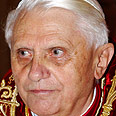
Mideast conflict blamed for Christian exodus
Bishops at Vatican synod say 'occupation' causes difficulties for Palestinian Christians; Rabbi David Rosen: Arab Chistian Israelis fare relatively well
Bishops summoned to the Vatican to discuss the flight of Christians from the Middle East have blamed the Israeli-Palestinian conflict for spurring much of the exodus and warned that the consequences could be devastating for the birthplace of Christianity.
Some bishops have singled out the emergence of fanatical Islam for the flight. But others have directly or indirectly accused Israel of discriminating against Arab Christians and impeding solutions to the Israeli-Palestinian conflict.
In fact, the working document of the two-week synod accused the Israeli "occupation" of Palestinian territories of creating difficulties in everyday life for Palestinian Christians, including their religious life since their access to holy sites is dependent on Israeli military permission.
Pope Benedict XVI called the two-week synod, which continued Wednesday, to try to encourage Christians in the largely Muslim region, where the Catholic Church has long been a minority and is shrinking as a result of war, conflict, discrimination and economic problems.
Israel: Just 1.82% Catholic
In Iraq alone, Catholics represented 2.89% of the population in 1980; by 2008 they were just 0.89%. In Israel, home to important Christian holy sites, Catholics made up 3.8% of the population in 1980; by 2008 they were just 1.82%.Some 185 bishops are taking part in the synod from Latin and Eastern rite Catholic churches across the region and from the diaspora. In addition, two Muslim imams and a rabbi were invited to address the synod.
Patriarch Gregory III, archbishop of the Greek-Melkites in Damascus, Syria, said fundamentalist movements such as Hamas or Hezbollah had been born from the Israeli-Palestinian conflict and warned Tuesday that the resulting flight of Christians would make a "society with only one color: only Muslim."
"Should this happen, should the East be emptied of its Christians, this would mean that any occasion would be propitious for a new clash of cultures, of civilizations and even of religions, a destructive clash between the Muslim Arab East and the Christian West," he said.
American Cardinal John Foley, a longtime Vatican official who now raises money to support Christian sites in the Holy Land, also said the conflict had contributed to the growth of Islamic fundamentalism but blamed Israeli policies specifically.
"While many including the Holy See have suggested a two-state solution to the Israeli-Palestinian crisis, the more time passes, the more difficult such a solution becomes, as the building of Israeli settlements and Israeli-controlled infrastructure in East Jerusalem and in other parts of the West Bank make increasingly difficult the development of a viable and integral Palestinian state," he told the gathering.
'Conflict preceded 1967 war'
Rabbi David Rosen, head of inter-religious affairs for the American Jewish Committee, said he expected some degree of blame would be voiced against Israel during the synod. But he said he thought the Vatican had done a responsible job in containing it and trying to ensure that the synod "is not totally politically hijacked by the Israeli-Palestinian conflict."
In his speech to the synod Wednesday, Rosen objected to the suggestion that the Israeli "occupation" of Palestinian territories was the root cause of the conflict, noting that the conflict preceded the 1967 war during which the West Bank and Gaza came under Israeli control.
"'Occupation' in fact is precisely a consequence of the conflict, the real 'root issue' of which is precisely whether the Arab world can tolerate a non-Arab sovereign polity within its midst," Rosen said.
He said Arab Christians in Israel fared comparatively well compared to Christian communities in other countries in the region, noting that their socio-economic status was higher than the Israeli average.
At a news conference, Rosen acknowledged that one issue - the recent decision by Israel to require new citizens to pledge a loyalty oath to a "Jewish and democratic" state - had ruffled some feathers and said he personally regretted it.
But he said it had been misunderstood by the Coptic Catholic patriarch of Alexandria, Egypt, Antonios Naguib, who is running the synod. During a first-day news conference, Naguib called the decision a "flagrant contradiction" since Israel claims to be the only democratic state in the region.
Rosen said Naguib "did not understand the difference between 'Jewish' as an ethnic collective and 'Jewish' as a religious expression, which is not what most Israelis understand the meaning to be of a Jewish state."
- Follow Ynetnews on Facebook










